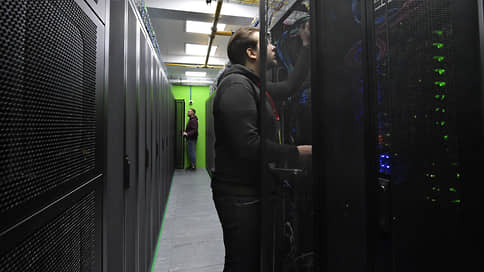Data is getting crowded – Newspaper Kommersant No. 186 (7387) dated 10/07/2022
[ad_1]

The Russian market of data processing centers (DPCs) in 2022 will increase by only 3 thousand new rack spaces, while in previous years it grew by at least 4-5 thousand racks, iKS-Consulting and 3data analysts calculated. The cost of placing equipment in data centers in Moscow and St. Petersburg, where the main capacities of data centers are concentrated, in September increased by 7.6% and 2.6% compared to the second quarter, respectively. Prices were affected by increased capacity shortages: operators do not have time to commission new areas due to problems with the supply of equipment, and some even postpone projects to 2023.
“Kommersant” got acquainted with the study of iKS-Consulting and the 3data data center network of prices for the colocation service (placing the customer’s equipment on the contractor’s premises) in the third quarter. It follows from it that in 2022 the number of rack spaces in the Russian data center market will grow by a little more than 3 thousand, which is about 6% of the racks available in operation, and will reach 55.7 thousand pieces. In previous years, more than 4-5 thousand racks were introduced annually, the study notes.
The cost of colocation services in the Moscow region and St. Petersburg in September increased by 7.6% and 2.6%, respectively, compared to the prices of the second quarter, iKS-Consulting and 3data note. Demand for data center services largely exceeds supply, says 3data CEO Ilya Khala. According to him, this trend can be observed throughout the country, although the main data centers are located in Moscow and St. Petersburg, and the regional market for data center services is just beginning to gain momentum. “Many market players have frozen or postponed projects for the next year,” he notes.
The deficit appeared against the backdrop of growing demand for domestic cloud services: due to the departure of global cloud providers from Russia, business is transferring IT infrastructure and services from foreign to domestic clouds, explained Pavel Kulakov, founder and CEO of the Oxygen data center. For many companies, it is now easier to move to the cloud than to independently purchase equipment in the face of disrupted supply chains, he added.
The cost of colocation services is affected not only by the departure of foreign vendors from Russia, “the general increase in prices for goods and services in the country affects; during the construction of a data center, it is necessary to supply electricity, install fire extinguishing systems, air conditioners and security systems – prices are rising for components and resources,” MTS noted. Since the beginning of the year, the delivery time for components, the cost of logistics and hardware solutions have increased, added Konstantin Ansimov, Director for Development of Infrastructure Projects at Selectel. “All this affects both the final price that providers set, and plans to expand their sites,” he said.
In the Moscow region, for a long time, the supply of data center services could hardly keep pace with demand, and recently, due to increased investment risks, commercial data center operators have put some projects on hold, the press service of Rostelecom-DPC noted. “The demand for accommodation services at the same time increased significantly, which led to an increase in prices,” they said. The company predicts that the deficit will continue in the Moscow region. At the same time, the situation will be better in the regions of the country – there is a reserve for free capacities in existing projects, and new ones are also ongoing, Rostelecom-DPC added.
The deficit in the capacity of data centers began during the pandemic due to the violation of the deadlines for commissioning new capacities, “the demand for the capacity of data centers continues to grow, primarily due to the growing need of the state for data storage against the backdrop of digitalization, the deficit has intensified with the imposition of sanctions and economic crisis this year,” says iKS-Consulting analyst Tatyana Tolmacheva. It influenced the pricing policy – large operators revised it and refused discounts, but in the regions the situation has not changed yet, the demand there is less, Tatyana Tolmacheva notes. If the operators’ plans to commission new capacities are fulfilled, the expert believes, the situation will stabilize.
[ad_2]
Source link





